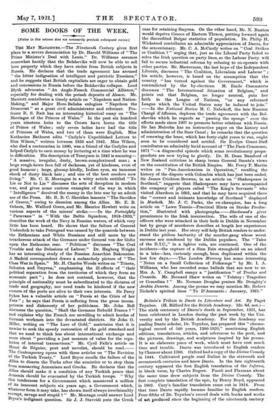SOME BOOKS OF THE WEEK.
Wales in this column does not necessarily preclude subsequent review.]
case for retaining Smyrna. On the other hand, Mr. N. Buxton would deprive Greece of Eastern Thrace, putting forward again the discredited Bulger statistics of population. Dr. Philip H. Wicksteed contributes an admirable appreciation of Dante, for the sexcentenary. Mr. C. A. McCurdy writes on " Coal Strikes or Coalition ? " urging that, just as the Liberal Party failed to solve the Irish question on party lines, so the Labour Party will fail to secure industrial reforms by refusing to co-operate with other parties. Mr. Masterman, the last hope of the Independent Liberals, discusses " The Coalition, Liberalism and Labour " ; his article, however, is based on the assumption that the country " has turned against the Government," which is contradicted by the by-elections. M. Emile Cammaerts discusses " The International Situation of Belgium," and points out that Belgium, no longer neutral, puts her faith in the League of Nations, "or any reformed League which the United States may be induced to join." —In the National Review M. C. Nabokoff, the late Russian Chargé d'Affaires, deplores the trade agreement with the Bol- sheviks which he regards as " passing the sponge " over the efforts made since 1907 to promote better relations with Russia. Sir Ian Malcolm has an instructive paper on the history and administration of the Suez Canal ; he remarks that the question of renewing the lease, which has forty-eight years to run, ought soon to be considered and settled. Sir Evelyn Grant-Duff contributes an admirably lucid account of " The Paris Commune, 1871 "—a disgraceful episode which some revolutionary propa- gandists are now trying to glorify. Dr. H. Dean Bamford of New Zealand criticizes in sharp terms General Smuts's views on the constitution of the British Empire. Mr. Percy F. Martin writes on " Pan-Americanism in Operation," recalling the history of the dispute with Colombia which has just been ended. Sir James Crichton-Browne, in an article on " Shakespeare in Scotland," suggests that Shakespeare may have accompanied the company of players called " The King's Servants " who visited Aberdeen in 1601, and that he may have acquired there the " correct and intimate knowledge of Scotland " displayed in Macbeth. Mr. J. C. Parke, the ex-champion, has a long article on " Lawn Tennis—Practical Hints on Stroke Produc- tion," illustrated with photographs.—Blackwood's gives prominence to the Irish insurrection. The wife of one of the officers who were attacked in their beds in Dublin in November last by gangs of murderers describes at length her experiences in Dublin last year. Her story will help British readers to under- stand the pitiless barbarity of the murder-gang whose worst excesses are condoned by the Dublin populace. The " Tales of the R.I.C.," in a lighter vein, are continued. One of tho incidents—the capture of a Sinn Fein stronghold on an island in a lake—has, curiously enough, been duplicated within the last few days.—The London Mercury has some interesting " Notes on a Small Collection of Folksongs " by Mr. L A. Williams, who has recorded some ballads that are new to us. Mrs. A. Y. Campbell essays a " justification " of Troilus and Cressida. Mr. Bernard Shaw writes on " Tolstoy : Tragedian or Comedian ? " Mr. Norman Douglas praises Mr. Doughty's Arabia Deserta. Among the poems we may mention Mr. Robert Nichols's spirited lines " To D'Armunzio : January, 1921."


































 Previous page
Previous page